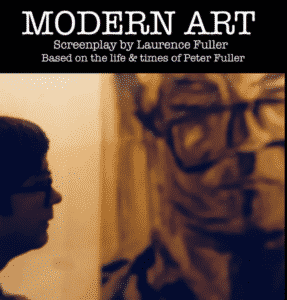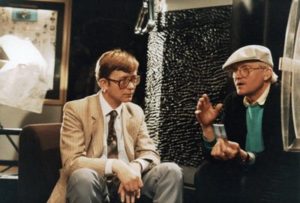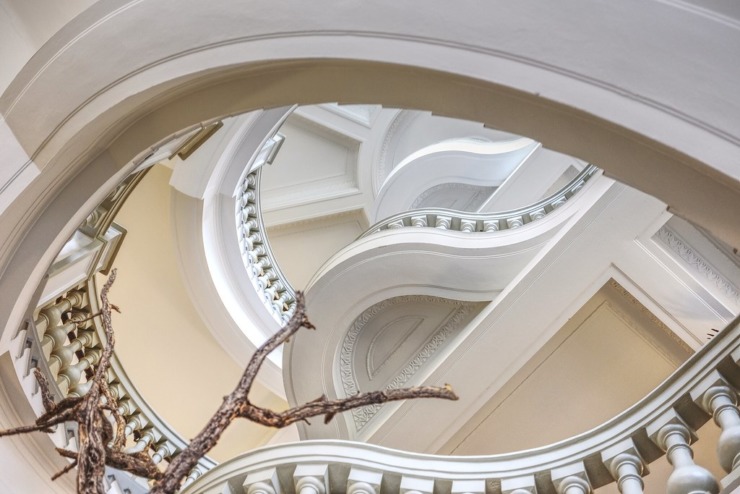I first happened across the film work of British actor, writer, and filmmaker Laurence Fuller through one of those quirky things that happen with the Internet. You’re looking for one thing, perhaps finding it or perhaps not, and something else pops up, leading to yet another link. And you discover a diamond in a world too often inhabited by plain rocks.
The film was a short one, entitled “Echoes of You.” It tells the story of a young man who desperately wants to be a concert pianist but is frustrated at every turn. The closest he can get to it is to become a janitor in a concert hall. And there he stays, until the day he finds a homeless boy by the trash bins behind the hall. The film is moving, heartbreaking, and ultimately triumphant.
Fuller has acted in a number of feature and short films. He originally trained as a stage actor at the Bristol Old Vic Theatre School. As a film writer and producer, his first film, “Possession(s),” was produced by ABC Australia. He also has a special project, entitled “The Peter Fuller Project,” an ongoing creation of documentaries, articles, and films about art critic, writer, magazine editor, and book author Peter Fuller.
Yes, there’s a connection. Laurence Fuller is Peter Fuller’s son.
 Peter Fuller (1948-1990) had an enormous impact on the art and culture of Britain in the 1970s and 1980s. In the early 1970s, he seemingly burst forth immediately as a noted art critic, writing for numerous art publications and reflecting something of a Marxist perspective, not unusual for the time. By the mid-1980s, however, he had shifted toward political conservatism, much to the chagrin of his more progressive friends and colleagues. He founded the magazine Modern Painters in 1987. During the roughly two decades of his post-university life, Fuller published some 18 books on art and art criticism, wrote countless articles for newspapers and magazines, and helped produce three film documentaries. In 1990, Fuller was killed in an automobile accident, one that involved his pregnant wife and young toddler son Laurence, who both survived the accident.
Peter Fuller (1948-1990) had an enormous impact on the art and culture of Britain in the 1970s and 1980s. In the early 1970s, he seemingly burst forth immediately as a noted art critic, writing for numerous art publications and reflecting something of a Marxist perspective, not unusual for the time. By the mid-1980s, however, he had shifted toward political conservatism, much to the chagrin of his more progressive friends and colleagues. He founded the magazine Modern Painters in 1987. During the roughly two decades of his post-university life, Fuller published some 18 books on art and art criticism, wrote countless articles for newspapers and magazines, and helped produce three film documentaries. In 1990, Fuller was killed in an automobile accident, one that involved his pregnant wife and young toddler son Laurence, who both survived the accident.

Peter Fuller interviewing David Hockney
“The Peter Fuller Project” is as much a way for the son to honor and recognize the father as it is for the son to try to know the man who was his father. Laurence Fuller has created a series of short films on art, painting, and painters paired with articles his father wrote on those subjects. As an example, see “Modern Art: Edward Hopper: The Loneliness Thing.” He’s produced a documentary film on his father and has now created a screenplay for a movie about his father’s life.
Entitled Modern Art, the screenplay has already won numerous awards and placed as a finalist in more than 15 competitions. It’s the story of Peter Fuller, to be sure, but it also tells the story of the people (and their fictional representations) critical to the British art scene in the last decades of the 20th century, including critic John Berger (1926-2017), the fictional art star Michael Minas, fictional art dealer Simon Deutscher, and several other real and created figures. A number of well-known personalities make cameo appearances, including Vanessa Redgrave, David Hockney, and Sir Roger Scruton.

Laurence Fuller
The story weaves between contemporary scenes and flashbacks, many reflecting Peter’s conflict with his religiously strict Catholic father, Harold. It moves expertly through the relationships, friendships, and ever-changing alliances between critics, dealers, and artists. It describes how much politics had come to permeate art and art criticism, and the price to be paid for sloughing that politics off. And it shows a man coming to grips with his father, his work, and his own life.
I never expected to be as fascinated and moved as I was with a screenplay about art critics, but it speaks to Laurence Fuller’s ability to tell a story and his understanding of both the times and the key people involved. It’s a story of how friends can betray friends while hiding behind a facade of friendship. It’s a story of the art world that seems timeless, as applicable today as was the 1970s and 1980s. And it’s a story of how a man finds his way to self-understanding. It’s no surprise that “Modern Art” has won awards and placed as a finalist in 15 competitions this year.
I hope “Modern Art” becomes a film. The screenplay deserves to be produced. It’s a story that speaks deeply to people who paint, sculpt, write, and film. It’s a story of one man, yet it’s a story about all of us.
Photo Erkki Nokso-Koivisto, Creative Commons, via Flickr. Post by Glynn Young.
__________________________

“I require all our incoming poetry students—in the MFA I direct—to buy and read this book.”
—Jeanetta Calhoun Mish
- Longfellow’s “Paul Revere’s Ride”: Creating a National Legend - April 17, 2025
- Poets and Poems: Katie Kalisz and “Flu Season” - April 15, 2025
- Poets and Poems: Michelle Ortega and “When You Ask Me, Why Paris?” - April 10, 2025

Leave a Reply